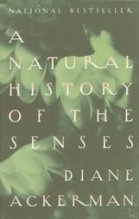
One of the earliest written documents on smell is a treatise known as De Odoribus, commonly attributed to Theophrastus of Athens (ca. 372 – ca. 287 BC). It dates back to the times when men wore white tunics, and sat under olive trees to ponder about life. Nature was a mysterious thing, and making sense of it (!) was based on experience rather than experiment. Although our outlook on Life and Nature has changed drastically over the course of centuries, we can still relate to the naturalist approach practiced in Ancient Greece. The huge popularity of Diane Ackerman's Natural History of the Senses is a case in point.
In a very broad and simplified definition, natural history is about merging notions from different scientific disciplines in an effort to understand how Nature works, and what it means to us. A Natural History of the Senses explores the human senses from that same perspective: the focus is on how smell, taste, touch, hearing, and vision affect us in our daily lives. In the author's own words:
What I wish to explore in this book is the origin and evolution of the senses, how they vary from culture to culture, their range and reputation, their folklore and science, the sensory idioms we use to speak of the world, and some special topics that I hope will exhilarate other sensuists as they do me, and cause less-extravagant minds at least to pause a moment and marvel. (p. xix)
Each chapter of the book is dedicated to a specific sense, but I'll stick to the one about smell. In little under 60 pages it explores the cultural and physiological commonplaces of smell, dealing with themes such as the lack of a proper odor vocabulary, the immediate emotional response triggered by olfactory perception, and the link between odor and flavor. There's a quick overview of olfactory prose by authors like Proust, Colette, Flaubert, Milton, Shakespeare, and Huysmans, and some interesting observations regarding the etymology of the word 'prostitute' in several European languages. Insights are given in anosmia, cross-cultural differences in body odor, and the social meaning of flatulence and stench; a whole section is dedicated to the question wether human pheromones exist (answer: they haven't been identified yet) and if you can bottle female genital secretions and use them as an aphrodisiac (answer: no).
In my opinion, the most fascinating part in the chapter on smell is the author's interview with Sophia Grojsman, the famous IFF perfumer. Ms. Grojsman speaks with great clarity about the creative process in perfumery:
One of the most important parts of putting a creation together is harmony. You could have layers of notes coming through the fragrance, but yet you still feel it's pleasing. If the fragrance is not layered properly, you'll have parts and pieces sticking out, it will make you feel uncomfortable, something will disturb you about it. A fragrance that's not well balanced is not well accepted. (p.49)
Ms. Grojsman mentions the grueling hours of work that modern-day perfumers spend in their labs. She prepares five hundred to seven hundred formulas a year herself — a stark contrast with the days when perfumers were free-lancers, and devoted as much time to a single composition as they deemed necessary. She then shares a little secret: in her dreams, she strives for an ideal perfume "so seductive to men that no woman could be resisted." (p.54) I guess that's a surprisingly openhearted confession, coming from one of the most professional people in the industry. In the interview she reveals many interesting facts about the perfume trade as well.
A Natural History of the Senses is in many ways a great read. The author's descriptions of sensorial experiences are compelling, and clearly geared towards a large audience. The downside is that the author's poetic style sometimes leads to oversimplification, which is a nuisance to people with a strictly scientific interest in the senses. Having said that, I'm sure the Ancient Greeks would have loved it.
A Natural History of the Senses
Diane Ackerman
New York: Random House Inc. (1990)
paperback, 331 pages
Diane Ackerman received her Ph.D from Cornell University, and is the author of many non-fiction and poetry books. Titles include The Moon by Whale Light (1991), Jaguar of Sweet Laughter (1993), A Natural History Of Love (1994), and An Alchemy of Mind: The Marvel and Mystery of the Brain (2005).
Marcello: I do love the way Colette describes flavors and aromas, esp. when she talks about flowers and her garden. Have you read her “Fruits and Flowers?” I wonder if Sophia Grojsman would put me on her “list” and send me her rejects, since I LOVE pefumes with the bits and pieces sticking out! If something is too well-blended I get bored quickly. Thanks for the review…I have this book but have not gotten around to reading it yet. I'll read the “smell” chapter. Kevin
thanks Kevin! I have to confess that I've never read anything by Colette. Whenever people refer to the Belle Epoque, they mention Colette; I know she was a very prolific writer, but unfortunately all I read about her in perfume books, forums, and weblogs is who her best friends were, and who she was involved with romantically. I'm glad you mentioned this title; I found “Flowers and Fruit” on Amazon, published in 1986. I suppose it's a collection of essays, right? I'll check it out.
Yes, essays. When Colette became crippled late in life a publisher would send her flowers once or twice a week and she would write about the flowers and all they meant to her. You MUST read something by Colette since you love fragrance so much and this would be a good book to start with! K
I'll order a copy of “Flowers and Fruit”. Thanks for the tip!